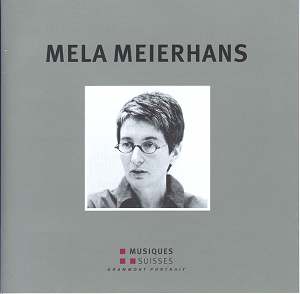
Mela MEIERHANS (b. 1961)
Differance I for large orchestra (2000) [7:30]*
Tunnel II (2002) [22:11]**
prelude and echo (2003) [10:47]ɚ
Narziss und Echo for solo clarinet (2004) [11:14] ɸ
Essays I-V for piano and voice (2005) [14:30] ±
Basel Sinfonietta/Jürg Wyttenbach*
MUSIQUES-SUISSES MGB CTS-M 100 [66:22]
From the first steam-engine-like chugs of Differance I, listeners will know that this disc will not be filled with music that caters to the toe-tapping hummability of Pops programmes. This release, part of a series of “portrait” discs from Musiques-Suisses, spotlights the recent (the oldest piece on this disc is only seven years old) output of Mela Meierhans, who currently has five discs released. Born in 1961 in Lucerne, Meierhans has quite a few compositions to her credit. According to her website, she is currently “Artist in Residence” in Cairo, researching the next instalment of her Jenseits trilogy.
Differance I is referred to by the composer as a “consultative improvisation” for large orchestra, to be performed in the dark. Meierhans states in the excellent liner notes that the piece is intended to demonstrate a “kind of indecision; something between active and passive.” A piece filled with tension, Differance I does have this element about it, but not at all in the strange state of suspension that Morton Feldman’s music has. Here we have a greater sense of unease and even malice.
Differance I, therefore, is a perfect lead-in to Tunnel II, a work for chamber ensemble, pre-recorded tape, and soprano. The piece is based on a short story by Friedrich Dürrenmatt, in which the characters are all on a train that stalls in a tunnel that is bored through one of Switzerland’s many mountains. I won’t give away any details of the story (I’ll say the trip doesn’t end well), but Tunnel II is downright harrowing, sure to give cause for pondering well after the piece ends. The work demands a great deal of flexibility and precision from the ensemble, which Ensemble Æquatour (themselves the subject of one of Musiques-Suisses’ portrait series) and Sylvia Nopper show themselves to great effect here.
The tone lightens up somewhat with prelude and echo, a work based on five poems in English by Anne Blonstein, a Basel-based poet. Unlike Tunnel II, the vocalist speaks in undertones or in non-words. Especially striking is a sombre, ethereal section seven minutes into the piece, sounding like one of the more pensive moments from Brian Eno’s Shutov Assembly. Throughout the piece the poems themselves are minced into bits of sound. The full texts are included, perhaps to give the listener a sense of what the music used as a springboard. One particularly telling phrase of Blonstein’s is in the last section: what words will do in the future/ they wrote. a venue in risk. “Safe” music this isn’t.
Narziss und Echo is described by Meierhans as a piece in which there is yearning for Identity. In both mythical characters we have different sides of the same coin; one who is completely absorbed in the self and the other only able to find expression in the utterances of others. Of the pieces included on this disc, this could be considered the one most conventionally “accessible,” though it departs quite readily from any standard tonality. With an extremely wide array of voicings, microtonalities, and glissandi, this is quite a virtuoso piece, though not in the typical sense of the word as far as empty flash is concerned. Franco Tosi gives an electrifying performance.
Overall, this disc’s recording aesthetic, as well as its exceedingly well-thought-out liner notes, shows Musiques-Suisses has kept its interest in presenting Swiss artists in a high-quality format. This music isn’t for everybody, and even for those who have interest in avant-garde music, this might not be everyday listening. This disc, as well as other discs in this series, is certainly worth looking into for extremely compelling performances.
No comments:
Post a Comment